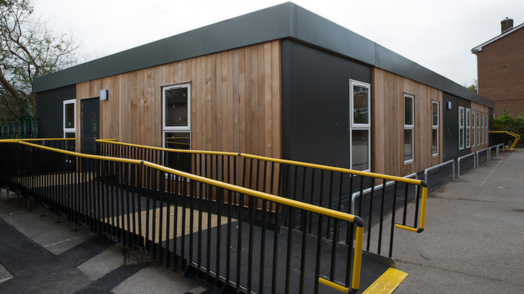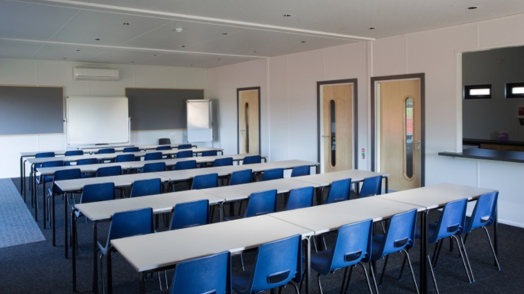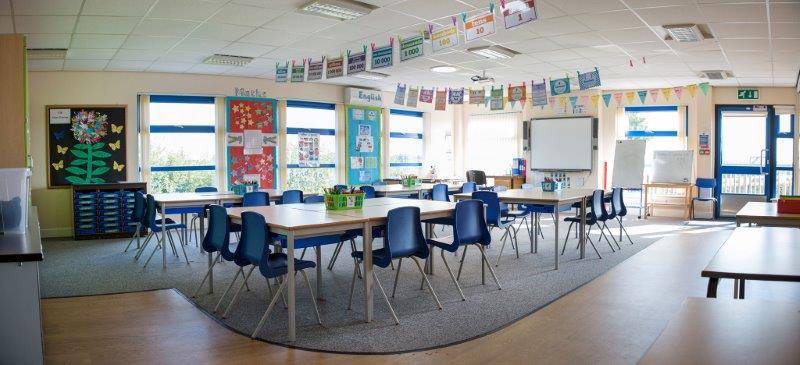Contact our friendly team for more information on our full range of buildings and how to start the process of hiring or buying a modular building for your business. Our expert team is always available to give advice, guidance or support.
Published: 20 November 2020 in Sectors
Getting School Building Programmes Back On Track: The Environmental Benefits Of Modular Construction

Many have been justifiably concerned about the impact COVID-19 will have on education, making it crucially important that school building programmes get back on track as soon as possible to ensure teachers and students have the best possible learning and teaching environments, as they make up for lost time. Therefore, in this article we look at how having a modular school building is worth considering, particularly in terms of environmental impact.
The modular industry has had a remarkable impact on reducing costs, whilst increasing quality and safety for schools across the UK. High-quality modular buildings are perfect for the education sector. And importantly, Springfield can create anything from temporary classrooms to multi-storey teaching blocks complete with offices, catering facilities and break rooms.
What Is Modular Construction?
Modular or prefabricated buildings are built almost entirely in off-site factories, as opposed to traditional buildings, which are constructed on-site. Modular construction involves fabricating a building in smaller units, called modules at the off-site factory and then transporting these to a construction site and assembling them to create a modular building.
Off-Site Construction And Modular Building Sustainability Benefits
Whilst modular building techniques and the buildings themselves have clear benefits in terms of worker safety, site efficiency and construction costs, there are also a host of environmental benefits. The benefits of prefabricated construction begin in the factory, continue on to the building site and last through the lifetime of the building.
Further, with students becoming more conscious of climate change, it is no small thing for a headteacher to introduce the concept of sustainable construction approaches and to understand and share how their new building will help to mitigate environmental impact.
Here are the key reasons worth noting:
- Reduced room for error: We plan your building, with you, and it is then manufactured in our ISO-approved workshop. Each individual material can be selected specifically for its performance characteristics which means your build will be bespoke and tailored to what your school needs. This also means less waste.
- Reduced lead times: Having gained considerable momentum over the past two years, advanced modular techniques can now reduce build times by an impressive 50 to 60%.
- Reduced construction cost: modular construction enables site work and building processes can be completed simultaneously which reduces labour costs and build times. Because multiple modules are being constructed simultaneously, materials that would be discarded on a normal construction site can be reused for other projects in a modular construction facility. It also means that your school can use the money saved elsewhere.
- Reduction in material waste: Eco-friendly materials are often used and waste is recycled for future projects wherever possible. Traditional construction generates around 56 million tons of debris every year, and reducing this amount would have huge environmental benefits.
- Green fixtures, fittings and finishes: Modern modular designs can be made to include many eco-focused features, like dimmable LED lighting, solar water heaters, occupancy sensors, batteries for energy storage and triple-paned windows. This can be much healthier for the planet.
- Reduction in energy use for construction and onwards: Since construction happens in a controlled factory setting rather than on-site, overall energy use is decreased in the course of making a modular structure. Additionally, on-site energy expenditures are significantly lower, as construction times are substantially decreased with modular buildings.
- Reduced transport-related impact: Modules are designed to withstand long-distance transportation and tend to be structurally stronger than most traditionally constructed building materials. 39% of global carbon emissions result from the construction field, and much of that is the result of inefficient transportation of labour, equipment and materials. By reducing overall transportation needs and optimizing the delivery of modules, modular construction is able to reduce total deliveries to building sites by 90%, which has an enormous effect on total emissions.
- Support for the reduce, reuse and recycle initiative: One of the distinct advantages of modular construction is that the designs aim for resilience and long lifespans to promote long-term sustainability. Unique to modular buildings is the ease with which they can be disassembled, either to be reused in other locations and configurations or recycled for new projects.
- Reduced disruption: Extensions to schools can be manufactured in well-managed factories and craned into position during holiday periods so there’s no disruption to the running of the school.
- Increased adaptability to existing surroundings: your modular building can be designed with existing structures and surroundings in mind, not turning green spaces into a concrete block.
- Insulation that reduces energy needs; Modular construction frequently includes a variety of features that reduce overall energy usage. Modular buildings maintain their temperature very well and require less heat or air conditioning than a traditional building.
- Increased architectural creativity: Modular buildings used to be considered as ugly grey buildings, but today contemporary modular buildings and designs are very different. They are fully compliant with building regulations and conceived especially for use as an education space based on current research on how children can learn effectively as well as with environmental features in mind.
We believe that off-site modular construction not only cuts costs and construction times but also benefits people and our planet. Therefore, we pride ourselves in the off-site techniques that we use to produce our modular buildings.
If you’d like some more information on projects we have previously successfully delivered, take a look at our case studies and testimonials. Or to find out more about our key environmental commitments as a business, take a look at our sustainability page.
Our schedule now stretches out into next year so if you are considering a new building, then now would be a good time to start the process.
To get in contact with our expert team, give us a call on 01744 851 958, fill out our contact form or request a call back.









